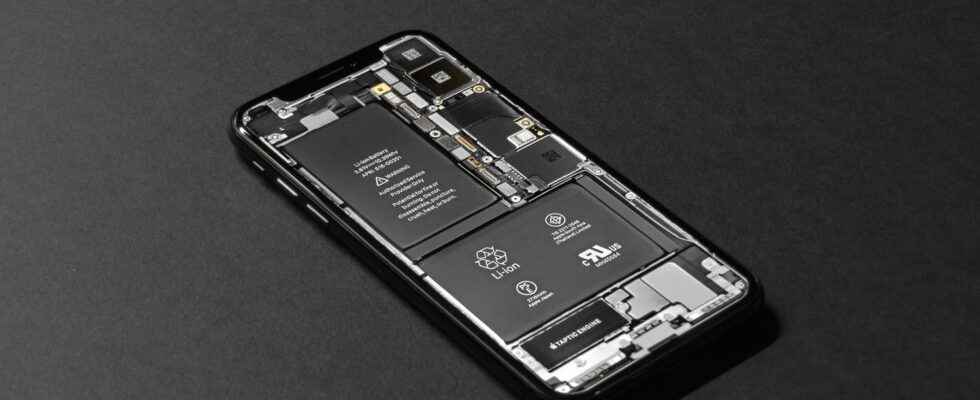The European Union will force manufacturers to make batteries more easily replaceable and recyclable. A text with serious consequences, which aims to reduce the ecological footprint while ensuring the sovereignty of Europe thanks to the circular economy.
Batteries are at the heart of our everyday mobile objects – whether for smartphones, computers or electric scooters – and, therefore, of our carbon footprint. Indeed, they are essential components, but they are particularly harmful from an ecological point of view – they are most of the time made from limited raw materials that are difficult to recycle. This is why theMEPs and the Member States of the European Union (EU) looked into the issue and reached an agreement on Friday 9 December setting up environmental rules on the production and management of batteries, and this so that they are “more durable, more efficient and more resistant”.
Cars, electric vehicles, bicycles, scooters, smartphones, computers, industrial batteries… All of them will have to meet sustainability, safety and circularity requirements in the years to come. The goal: to boost their production in Europe while limiting their ecological impact. This law, for the time being provisional, will cover “the entire battery life cycle, from design to disposal, and will apply to all types of batteries sold in the EU “, explains the parliament. This project therefore concerns portable batteries (for telephones and computers), SLI batteries (for “heavy” vehicles, such as electric cars), light means of transport (MTL: for wheeled vehicles such as scooters and electric bicycles), batteries for electric vehicles (EV) and industrial batteries.
European agreement: batteries easier to change for consumers
The Battery Act covers several aspects of the sector. First, it must directly benefit consumers, by making batteries more efficient, safer and easier to remove and replace, within three years. Indeed, when the battery of a mobile device fails or reaches the end of its life, the device becomes completely unusable, for lack of being able to replace it easily. This is true for phones, tablets and laptops, but even more so for small devices such as wireless headphones, which are very difficult to disassemble and repair. An ecological and technical aberration because it is much smarter to change the defective battery than to buy a new device to replace it. A point that poses a problem for some major manufacturers, including Apple. If the firm is making efforts with its new models – in particular the iPhone 14, of which eleven elements can be changed, against only one for the first iPhone – the repairability index of its devices is rather low. But this “defect” also concerns all smartphone manufacturers who have abandoned the replaceable batteries still used a few years ago by non-removable models…
Another point: all batteries will have to carry labels and QR codes to inform consumers – who are a key lever for change – about their performance, lifespan and composition. For the batteries of scooters, cars and certain industrial batteries, they will have to be provided with a “digital battery passport” detailing their characteristics and their uses.
Batteries: A Due Diligence Policy for the Industry
In order to reduce the quantity of resources that have to be imported into Europe – especially as they are sometimes produced in deplorable working conditions, by employing children, for example – the EU has also set up targets collection and recycling requirements. Thus, for portable batteries, companies must have a recovery rate of at least 45% from 2023, 63% for 2027, and 73% before the end of 2030. For batteries for bicycles, electric scooters and scooters, the rate minimum collection will be 51% by 2028, and 61% by 2031. All MTL, EV, SLI and industrial batteries will have to be collected from users free of charge. The text also imposes minimum levels of certain metals recovered from manufacturing and consumer waste – 16% for cobalt, 85% for lead, 6% for nickel and 6% for lithium – to be reused for composition. new batteries. Finally, between now and December 31, the Commission reserves the right to decide on the need to prohibit the use of non-rechargeable portable batteries.
Compliance with EU green production criteria will be a prerequisite for the sale of a battery within the Union. “This law sets environmental requirements for all batteries, whether produced in Europe or imported, and will gradually restrict access to the European market to the most durable batteries”, explains Pascal Canfin, Chairman of the Environment Committee of the European Parliament. But the interest is not only ecological. This agreement aims to guarantee Europe’s energy economy when, according to forecasts, its battery needs will be 14 times greater by 2030. Indeed, it seeks to strengthen the European battery industry – the famous circular economy – while reducing the EU’s dependence on imports of critical metals – hence the rates of recycled lithium, nickel, cobalt and lead. Because in this sector, Europe is only third behind Asia – in particular China, Japan and South Korea – and the United States. By 2030, Europe is aiming for 25% of global battery production, compared to only 3% in 2020. To achieve this, the Old Continent is increasing investment in the sector, with around forty battery plant projects. batteries in 2021. For the moment, the text is only in its development stage, and the resulting law must be voted by Parliament and the Council of Europe before being applied.
